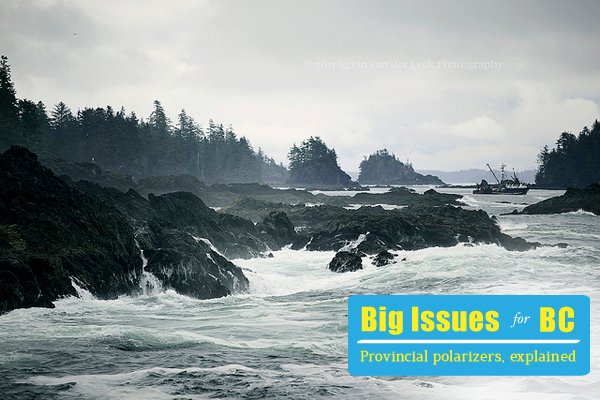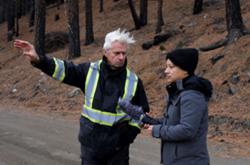[Editor’s note: With voting day just over two weeks away, we look back on big issues that have driven debate in our province during the last 12 years of BC Liberal governance. What did B.C.'s leaders and opposition parties say and do on these major files? What are they saying now? What are the facts? Humbly offered here, a cure for political amnesia among candidates and media alike. Today, we walk you through B.C.'s record on climate policy.]
It's hard to believe today, but back in January 2007 a lot of people cared a lot about climate change.
It had been a weird, warm winter in much of Canada. Al Gore was showing his documentary, An Inconvenient Truth. Newscasts talked about endangered polar bears.
A Decima poll suggested that Canadian voters thought the environment was at least as important as the economy, which, we should remember, appeared to be steaming along merrily. Even Prime Minster Stephen Harper was trying to look green.
In B.C., premier Gordon Campbell had done some reading about climate change and decided that B.C. would be a world leader when it came to cutting planet-warming greenhouse gases. As was his wont, he threw all the resources of the government into his new enthusiasm.
Word leaked to environmentalists, who speculated that Campbell would commit the province to the kind of GHG reduction targets that California had recently adopted. They weren't disappointed.
In February, Campbell announced that B.C. would cut its emissions by at least one-third by 2020. Alternative energy sources would be encouraged. Ninety per cent of the province's electricity would have to come from clean, renewable sources.
Not everything fit into this new green world, however. The 2007 provincial budget talked about expanding the oil and gas industry, including offshore drilling. Environmentalists were not so happy about that.
They were more pleased a year later when the 2008 budget promised $1 billion for climate action, North America's first comprehensive carbon tax and a regional cap and trade scheme that would reduce industrial emissions.
From a policy wonk's point of view, the carbon tax had an elegant feature -- it was revenue neutral. Every penny the government took in from the carbon tax would be returned through income tax cuts. As the carbon tax increased gradually, tax breaks would increase, too. That way, people would have an incentive to cut emissions, but wouldn't be punished unduly.
This was no tax grab, the government declared. It was a tax grab, British Columbians immediately decided. Northerners claimed they were being discriminated against, even though the data suggested otherwise.
Era of axe the tax
Right-wing interest groups denounced the tax based on nonsense math. The New Democratic Party tried to launch a populist Axe the Tax revolt, based on some equally goofy numbers. And it didn't help the government that the tax came in just as gas prices spiked.
Meanwhile, the contradictions continued to pile up. Gordon Campbell's greenest government in the world was busy paving a huge chunk of the Lower Mainland with its Gateway Program, which environmentalists argued would inevitably increase GHG emissions. And as the 2009 election approached, Campbell appeared to be losing interest in his Climate Action Plan.
The NDP went into the 2009 election vowing to axe the tax, claiming it "let big polluters off the hook," a statement that contained at best perhaps a small fraction of a grain of truth. Environmentalists urged the party to drop its opposition to the tax. The NDP seemed shocked that their putative allies had abandoned them. More dumb math popped up to embarrass the party.
Meanwhile, The Tyee's Geoff Dembicki reported that a huge northeast energy proposal from EnCana "could pump up to two million tonnes of CO2 a year into the atmosphere," seriously undermining the government's emissions targets.
We'll never know how much impact the carbon tax had on the 2009 election. Any support the NDP gained from disgruntled taxpayers appears to have been offset by defecting environmentalists. The overall results were virtually unchanged from 2005. In the end, the global economic crisis was probably much more of a factor than climate policies.
Four new paths on offer
The Campbell Climate Action Plan is still around, but these days experts are predicting that the government won't hit those ambitious emissions targets. Much of the action plan is yet to be implemented, and there appears to be little political will to do so. The Christy Clark government's obsession is developing natural gas, which is likely to increase the province's emissions.
The BC Liberal platform uses the word "climate" twice, once in a quote from New Democrat Carole James. The platform states: "While other governments talked about climate change and the environment, we acted. When leadership mattered, Adrian Dix and the NDP opposed the carbon tax."
The Liberals plan to freeze the carbon tax for five years "to allow jurisdictions to catch up to B.C.'s leadership position."
The governing party is also reviewing the Pacific Carbon Trust, an agency set up to oversee what has become the most controversial aspect of the Campbell plan. The trust was created to find and sell carbon offsets to government ministries and agencies. In 2011, the government declared itself "carbon neutral," but that claim has been challenged.
In March, auditor general John Doyle concluded that the government wasn't carbon neutral and that the trust's offsets were not credible. Environment Minister Terry Lake immediately replied that he and the government "fundamentally reject" Doyle's conclusions.
However, on the campaign trail Premier Christy Clark has been less supportive of the trust. "Well, we're reviewing it," she told reporters April 22. "It hasn't worked... it hasn't worked that well. It hasn't worked perfectly, I don't think, as expected."
The NDP has vowed to eliminate the Pacific Carbon Trust. It would keep the carbon tax but not raise it. It would expand the tax to cover vented oil and gas emissions and would use carbon tax revenues to pay for environmentally friendly projects such as transit, thereby scrapping the revenue-neutral feature.
Of the four major parties, the Green party has the most detailed climate policy plank in its platform.
"The most effective and fastest way to reduce GHG emissions is through a well-designed and implemented universally applied carbon tax," the party states. The Greens would immediately raise the carbon tax to $50 a tonne from the current $30. That would increase the price of a litre of gas by about four cents.
The BC Conservative Party would phase out the carbon tax over four years. The tax "discriminates against British Columbians living in rural, northern and remote areas" and "harms B.C. agricultural producers who compete against producers and ranchers in other jurisdictions," the party says.
The Conservatives would also scrap the Pacific Carbon Trust, "a corporate welfare system that takes money from important programs and services that benefit British Columbian families to subsidize eco-friendly corporate projects." ![]()
Read more: Environment, BC Election 2013

















Tyee Commenting Guidelines
Comments that violate guidelines risk being deleted, and violations may result in a temporary or permanent user ban. Maintain the spirit of good conversation to stay in the discussion.
*Please note The Tyee is not a forum for spreading misinformation about COVID-19, denying its existence or minimizing its risk to public health.
Do:
Do not: